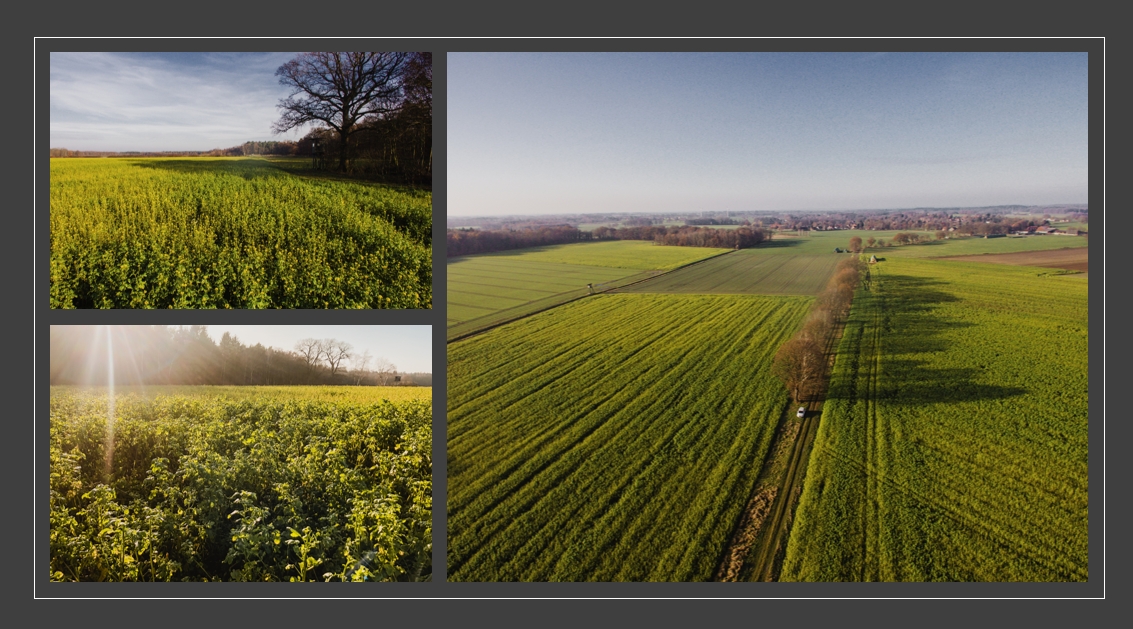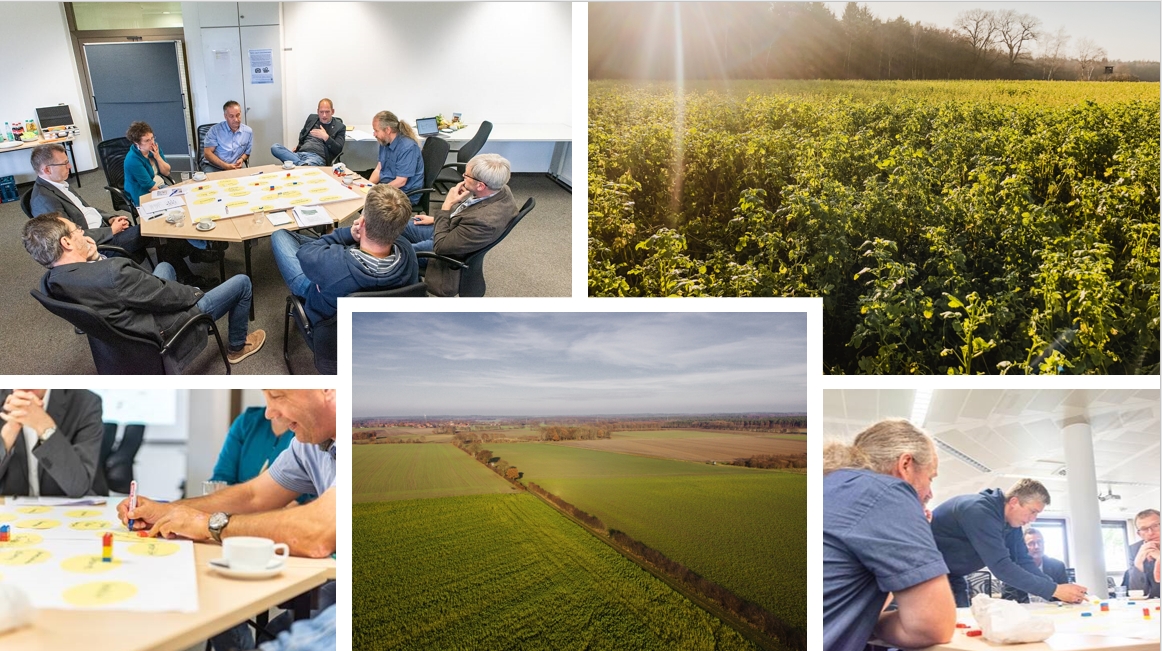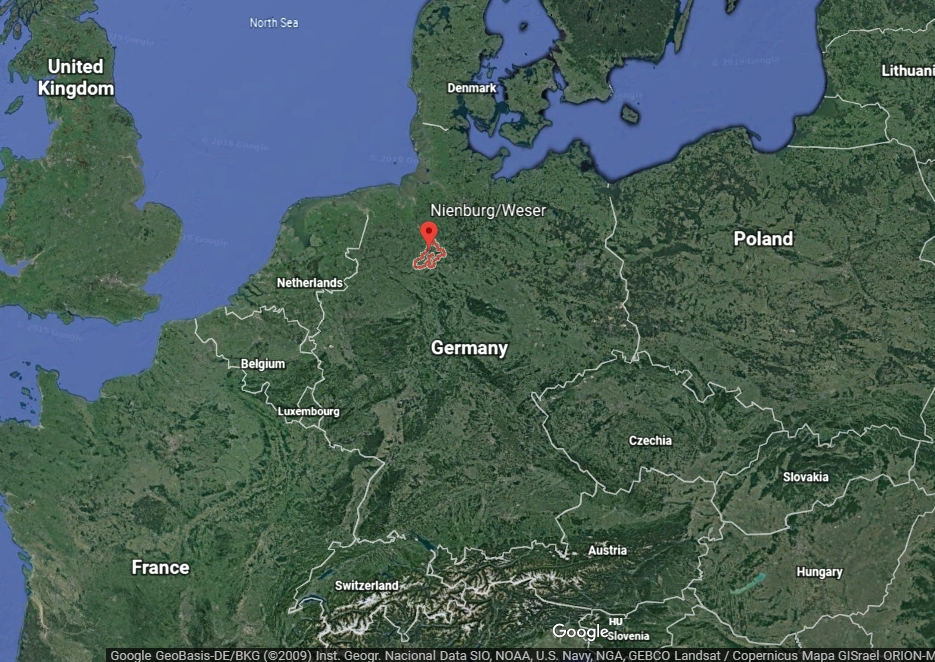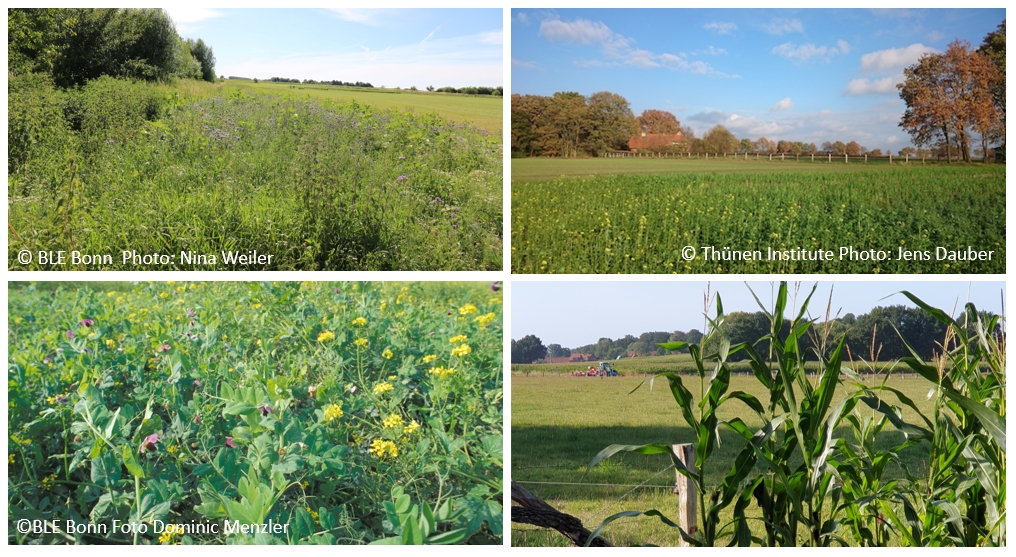CASE STUDY DILEMMA AND RESEARCH QUESTION
How to integrate agro-ecological practices on arable land (conventional and organic) in highly maket-oriented farming systems to reduce biodiversity loss and water pollution threats without significant negative impacts on the economic viability of farms?
KEY CHARACTERISTICS AND SUSTAINABILITY ISSUES OF THE FARMING SYSTEM
The area under study is the County Nienburg in the North German Plain. The county comprises an area of approximately 83,100 hectares, and approximately 1500 farms (Polaschegg, 2018). The Nienburg County in Lower Saxony comprises an intensive agricultural area with sustainability issues regarding biodiversity loss and water pollution. The case study area is adjacent to intensive livestock regions with high land prices. Particularly the latter exposes farmers to a high degree of economic market pressures. The German case study provides an example for the analysis of what is required to initiate a transition process to agro-ecological farming in cases of highly market-oriented farming with low level of agro-ecological innovation.
Farms are mainly conventional and implement few agro-ecological practices. Arable land is the dominating the agricultural land use in the case study area. Farms produce crops for food, feed and energy and the main commodities are maize, winter wheat, winter barley, winter rye and winter rape. Crop outputs are sold unprocessed to local agricultural cooperative and livestock is mainly sold to large meat processors. The key actors are farmers who decide upon whether or not to implement agro-ecological practices. Cooperation consists of undertakings with no direct connection to agro-ecological practices, yet with impacts on the economic dimension of the case study dilemma. This includes the share of machinery, the exchange of substrate, manure and crop products. Their decision-making process on adopting agro-ecological practices is driven by their understanding of nature and nature protection and its integration in farm business aspects.
Initiating agro-ecological transitions in arable farming systems in the County Nienburg requires a wider interpretation and understanding of the boundaries of the social-ecological system beyond the farm gate to capture and analyse the interactions and contributions of the identified key actors to overcome the barriers for agro-ecological transitions.

KEY ACTORS INVOLVED THE CASE STUDY MULTI-ACTOR PLATFORM AND OTHER ACTIVITIES
The case study is carried out with support from the Chamber of Agriculture Lower Saxony in Nienburg and involves representatives of the following actors:
- Farmers
- Advisory services and auditors of the Chamber of Agriculture Lower Saxony
- Trade standards, GlobalGap
- Water Management Association
- Administration County Nienburg, Lower Nature Protection Authority
- NABU Lower Saxony
- Lower Saxony Ministry of Food, Agriculture, and Consumer Protection
- Researchers from related other Horizon 2020 and national projects (e.g. CONSOLE, DiverIMPACTS and Mediate)
AGRO-ECOLOGICAL PRACTICES AND SUSTAINABILITY TRADE-OFFS
To initiate a practically feasible and generally accepted transitions towards a more sustainable agricultural system, key is identifying and integrating suitable agro-ecological practices which address the sustainability issues but result in no significant (or rather limited) negative impacts on the economic viability of farms. In the course of co-constructing an agro-ecological transition strategy with members of the Multi-Actor Platform, a variety of agro-ecological practices have been identified. The following three have been selected and implemented for assessing their trade-offs in further detail, namely:
- Reduced tillage.
- Implementing agri-environmental (and similar) measures on 10% of the agricultural area, e.g., flower and buffer strips.
- Intercropping.
The sustainability analysis of this case study was conducted by considering the simultaneous implementation of these three agro-ecological practices on selected case study farms to simulate a practically feasible and generally accepted transitions towards a more sustainable agricultural system in conventional and market-oriented arable farms with and without pig husbandry. The simultaneous implementation of all three AEPs contributed to reduce the GHG emissions from arable land and smaller improvements of soil and water quality in the farms. In addition, increases in genetic, species, and habitat diversity in the farms could be observed. Notably, the environmental impact on biodiversity or water quality from implementing agri-environmental measures on 10% of the agricultural area would be very dependent upon the precise designs of the measures, including their type and location. The implementation of reduced tillage has only minor adverse impacts on the economic performance of farms But the results indicate that the environmental benefits of the joint implementation of the three agro-ecological practices comes with trade-offs in the economic farm performance resulting in reductions in labour productivity and lower farm income.
KEY BARRIERS OF IMPLEMENTATION AGRO-ECOLOGICAL PRACTICES
The implementation of agro-ecological practices I hindered by cultural and knowledge barriers, economic barriers and policy related barriers.
Attitude of farmers towards agro-ecological farming and knowledge of agro-ecological practices and their benefits
Barriers of agro-ecological transitions are the attitude of farmers towards agro-ecological farming and their beliefs of environmental sustainability issues. The attitude is driven by a tradition of conventional practices and strong market orientation that lead to an unwillingness to adopt agro-ecological practices. Biodiversity loss is perceived less as a problem than the economic viability of the business which aggravated by uncertainty that their individual actions might positively impact biodiversity. The attitudes of farmers and their willingness to implement agro-ecological practices are shaped by trust between them and other relevant actors. Trust between farmers and actors who are, or will in the future, collaborate in the transition to agro-ecological farming is particular important. While the level of trust be-tween the advisory services and farmers is often high, lack of trust is an issue in the context of the implementation and monitoring of policy measures such as agri-environmental measures. The attitude and beliefs of farmers of agro-ecological farming practices and environmental sustainability issues are also partly driven by the gaps in the knowledge of the range of agro-ecological practices that suit a particular farm and the benefits of the practices. The barrier of gaps in agro-ecological knowledge of farmers is explained by low cooperation and capacity building on agro-ecological practices and their benefits and by being unaware of funding opportunities for receiving suitable advice.
Access to land and conditions of land rental agreements and lack of added value
Another important barrier of transition is the concern of losing access to land, if agro-ecological practices are implemented that might reduce the economic value of agricultural land. This fear is explained by the control land owners have over the conditions of land rental agreements with farmers. The main goal of land owners is often to secure the economic value of the agricultural land. They can restrict what farmers can grow and how they manage the land. Increased scarcity of agricultural land due to non-agricultural land use and demand from intensive livestock systems in adjacent areas increase the relevance of this barrier.
Lack of added value from production systems with agro-ecological practices are an economic transition barrier. Current channels of processing and trading do not differentiate between arable crops that were produced on farms that implement and follow agro-ecological or sustainability principles (other than organic farming certification). As a consequence, market incentives and remuneration of specific agro-ecological benefits certified by a specific standard do not exist.
High bureaucracy, strict control mechanisms and a lack of flexibility
Negative experiences with a high level of bureaucracy of the CAP payment system, detailed monitoring at a level of a square meter and perceived high risks of financial penalties have negatively impacted on their willingness to sign up to agri-environmental measures supporting the adoption of agro-ecological practices. Instead interest is developing to learn more about, and consequently trial initiatives outside the CAP framework.
KEY ACTIONS AND STRATEGIES TO OVERCOME BARRIERS
By working together with local actors, strategies and actions were identified to enhance the sustainability issues by addressing the previously outlined barriers.
Enhancing agro-ecological knowledge of farmers and attitudinal changes
- Formal knowledge networks of farmers with trusted and trained agro-ecology advisors as local permanent network manager
- Building on trusting relationships between some farmers and advisors facilitate the network development and on peer-to-peer engagement through farmers already experienced in cooperation
- Targeted support through policy and public funds can facilitate the process, e.g. results-oriented agri-environmental payments and integration of advice into agri-environmental support, support for implementing and educating local network managers, support to enhance the technical know-how of the advisors and controllers.
Promoting the implementation of agro-ecological practices through improved conditions of land rental contracts
- Involve landowners in the transition process and multi-actor platforms and to educate and raise awareness of benefits of agro-ecological practices to landowners.
- Involvement of landowners through coordination and moderation led by local and regional authorities proposed.
- Explore opportunities for providing financial incentives (such as tax reductions) to enhance willingness of landowners to allow for (or demand) agro-ecological practices on their land.
Creating added value for farmers from agro-ecological production systems
- Building on increased interest in locally produced food and initiating regional food association and food policy councils with memberships of farmers to create markets for "agro-ecological products" and to enhance the linkages between producers and consumers.
- Objective consumer education is required to increase society’s willingness to pay more for locally and agro-ecologically produced food.
- Strengthening and expanding existing school programmes (such as https://www.schulprogramm.niedersachsen.de) has the potential to educate (future) consumers and raise awareness of benefits of agro-ecological approaches.
- Developing value chain structures for processing alternative products (including malthouses, roasting facilities or distilleries).
- Promoting generation of added value by establishing legal requirements to integrate biodiversity standards into the supply chain and result-oriented payments to enable adequate renumeration of benefits of agro-ecological practices provided to society.
Reducing the bureaucracy of policy support and control mechanisms associated with receiving funding for implementing agroecological practices
- Flexibility of implementation, monitoring and controlling: Ensuring technical know-how of advisors and controllers to allow for practical solutions, monitoring long-term effects, and result-based approaches to enhance the flexibility of implementation and controlling of agro-ecological practices.
- Involve trusted peers (farmers) in the monitoring and controlling of policy measures.
- Introducing local network managers as link between farmers and official authorities to facilitate communication and enhance trust. The network manager requires a high degree of acceptance and reputation by both farming and political agents.

KEY LESSONS LEARNT
The case study has shown that solving the sustainability issues in the Nienburg County requires:
- local champions, such as trusted biodiversity advisors and farming peers, acting as a facilitator for knowledge networks that improve social, cultural and human capital and, thus, addresses related main barriers of transition.
- adding value to products which were produced in a more agro-ecological manner. Although the implementation of single practices (e.g. reduced tillage) has some potential to enhance biodiversity and provide further public goods while having only minor adverse impacts on the economic performance of farms, major steps towards a more sustainable production require the implementation of bundles of measures (e.g. strip cropping, intercropping and reduced tillage). This, however, reduces the economic viability of farms substantially.
- innovative design changes to existing rural development measures, such as result-based approaches and the integration of advice into existing agri-environmental programmes. These instruments have the potential to successfully promote agro-ecological transitions, if they are accompanied by measures that raise both public awareness and the demand for "agro-ecological products".
References
Polaschegg, M. (2018) Landwirtschaftlicher Fachbeitrag zum Regionalen Raumordnungsprogramm des Landkreises Nienburg / Weser. Landwirtschaftskammer Niedersachsen.
Download
- UNISECO H2020 issue brief: Adding value to agro-ecological practices in market-oriented arable farming
- UNISECO H2020 issue brief: Marktimpulse für eine gesteigerte Wertschöpfung durch agrarökologische Praktiken im marktorientierten Ackerbau
- UNISECO H2020 policy brief: Supporting knowledge networks for sustainable farming practices in Lower Saxony
- UNISECO H2020 policy brief: Förderung von Wissensnetzwerken für eine nachhaltige Landwirtschaft in Niedersachsen
- Barriers and drivers of agroecological transitions in intensive agricultural areas – a case study from Germany – Poster presented at the Annual Meeting of the American Association of Geographers 2019 in Washington, DC
- Project flyer (DE)
Related newsitems
- https://uniseco-project.eu/news/107/workshop-of-the-map-in-the-de-case-study-to-co-construct-strategies-for-agro-ecological-transitions-of-arable-farming-systems
- https://uniseco-project.eu/news/66/social-network-analysis-workshop-in-the-german-case-study
- https://uniseco-project.eu/news/138/position-paper-policies-for-agroecology-in-europe-building-on-experiences-in-france-germany-and-the-united-kingdom
From above: Nienburg, Lower Saxony from Johannes Carolus on Vimeo.
DEVELOPING STRATEGIES FOR INITIATING AGRO-ECOLOGICAL TRANSITIONS IN ARABLE FARMING SYSTEMS IN NIENBURG COUNTY, LOWER SAXONY

